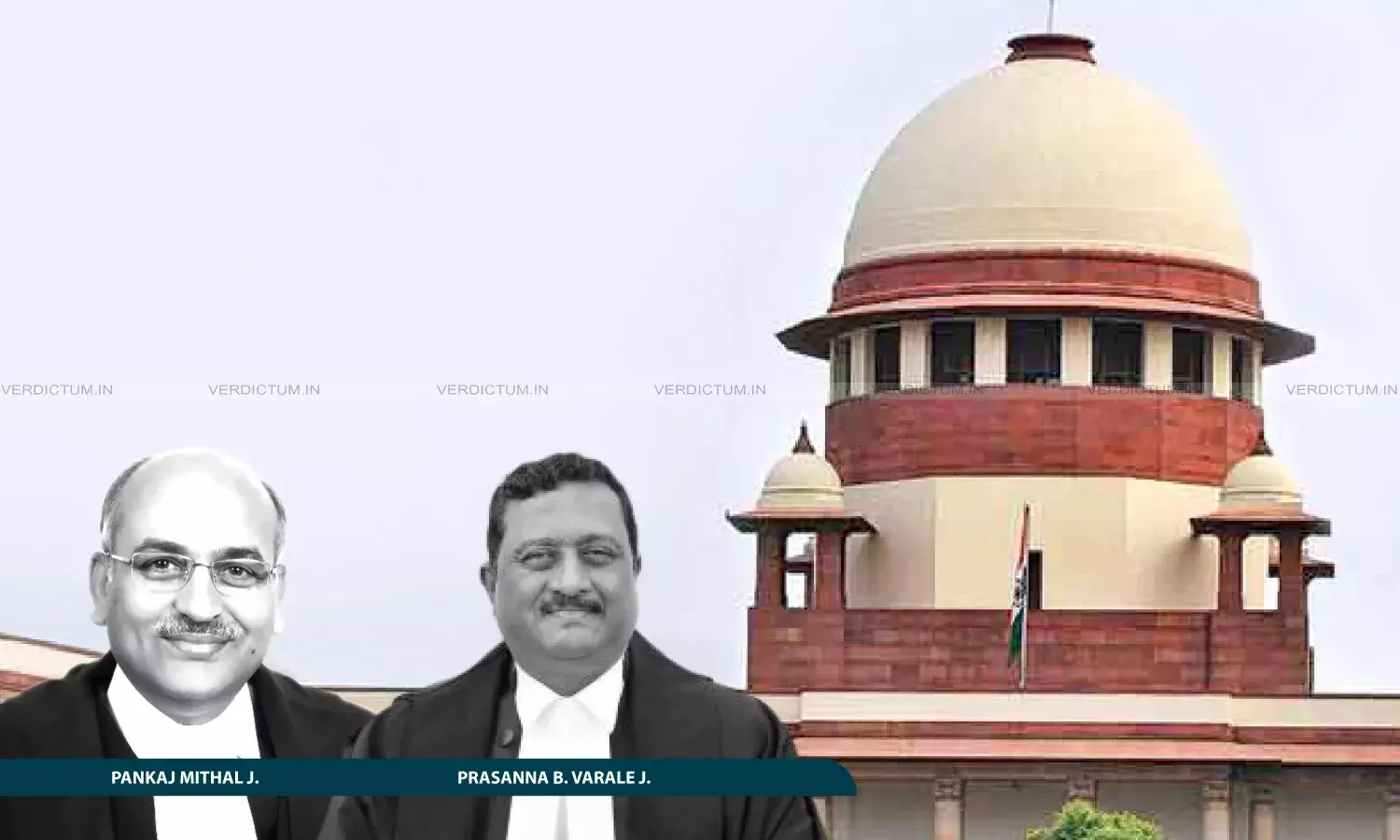To Convict A Person Under Corruption, Demand & Acceptance Of Illegal Gratification Is A Sine Qua Non: Supreme Court
The Supreme Court was considering two Appeals against their conviction by the Special Court under the Prevention of Corruption Act,1981.

Justice Pankaj Mithal, Justice Prasanna B. Varale, Supreme Court
The Supreme Court has held that to convict a person in corruption cases, demand and acceptance of illegal gratification is a sine qua non.
The Court was considering two Appeals against their conviction by the Special Court under the Prevention of Corruption Act,1981.
The division bench of Justice Pankaj Mithal and Justice Prasanna B. Varale observed, "The argument that the Court cannot show compassion to reduce the sentence by exercising powers under Article 142 of the Constitution is misconceived as the Court is not showing leniency by overriding or going beyond the statutory provisions. The reduction of sentence is within the scope of the statute which provides for a minimum sentence of one year."
The Appellant was represented by Advocate-on-Record M.P. Parthiban while the Respondent was represented by Senior Advocate Dr. Joseph Aristotle S.
Facts of the Case
The Special Court under the Prevention of Corruption Act, 1981 had convicted both the accused under Section 13 and Section 7 of the Act. Accused No. 1 was awarded three years RI with fine of ₹10,000/- under Section 13(1)(d) read with Section 13(2) of the Act and 2 years RI with fine of ₹5,000/- under Section 7 of the Act and in the event of non-payment of fine with SI of 3 months each. Similarly, Accused No. 2 was awarded sentence of 1.5 years of RI with fine of ₹2,000/- under Section 13(1)(d) read with Section 13(2) of the Act and 1 year RI with fine of ₹2,000/- under Section 7 of the Act and in the event of default in payment of fine with SI of 3 months each. The High Court upheld the conviction and sentence awarded by the Trial Court in Appeal before the High Court.
Senior Counsel for the Appellants argued for the reduction of sentence to Accused No. 1 and for setting aside of conviction of Accused No. 2. He submitted that the High Court failed to consider that the age of Accused No. 1 is 68 years and that he was involved in a case pertaining to a petty amount of ₹500/- as bribe and that too in the year 2004 and therefore keeping in mind the time elapsed and the small amount of the bribe, the sentence imposed upon him is excessive and it could be reduced to the statutory minimum sentence of one year.
In context with Accused No. 2, he submitted that his conviction is illegal in the absence of evidence that there was demand of illegal gratification by him or that he was present when Accused No. 1 originally demanded the bribe and therefore, unless there is demand and receipt of the bribe, he cannot be convicted. It was further submitted that he cannot be convicted for merely accepting the money as there was no specific charge of abetment or allegation that Accused No. 1 was the abettor of the crime.
Reasoning By Court
The Court at the outset referred to its ruling in Neeraj Datta vs State (NCT of Delhi) wherein it was held that for recording a conviction under Section 7 and Sections 13(1)(d)(i) and (ii) of the Act, the prosecution has to prove the demand and acceptance of illegal gratification either by direct evidence which can be in the nature of oral evidence or documentary evidence or circumstantial evidence. In other words, to convict a person under the aforesaid provision demand and acceptance of illegal gratification is a sine qua non.
Noting that in the absence of any allegation or evidence that Accused No. 2 demanded bribe from the Complainant or he was acting in connivence with Accused No. 1, he cannot be prosecuted for the commission of the crime of demanding and receiving illegal gratification, the Court cited its ruling in Mahendra Singh Chotelal Bhargad vs. State of Maharashtra & Ors. wherein it had an occasion to deal with the case where the bribe was demanded by one person and was accepted and recovered from a third person. The conviction of the said third person was set aside, holding that accepting money on behalf of another person may certainly constitute an abetment of an offence, but in the absence of a charge of abetment, the person accepting the bribe is not liable to be convicted. Accordingly, the Trial Court as well as High Court manifestly erred in convicting him for an offence under Section 7 and 13 of the Act.
"There is no dispute to the fact that the offence was allegedly committed in the year 2004 and it involved a small amount of Rs. 500/-. A-1 had suffered on account of the pendency of the trial and appeal for all these years. The long time that has elapsed during the trial and the appeals coupled with the fact that the amount involved is small, it appears just and proper to award the minimum sentence prescribed under the Act", the Court observed.
It thus confirmed the conviction of Accused No. 1 but reduced his sentence from three and two years respectively to the minimum of one year for both the offences as prescribed under the Act and modified the judgment and order of the High Court as regard to Accused No.1.
The Appeal was accordingly allowed.
Cause Title: A. Karunanithi vs. The State Represented By Inspector Of Police [Neutral Citation: 2025 INSC 967 ]
Appearances:
Appellant- Advocate-on-Record M.P. Parthiban
Respondent- Senior Advocate Dr. Joseph Aristotle S, Advocate-on-Record Sabarish Subramanian
Click here to read/ download Order

